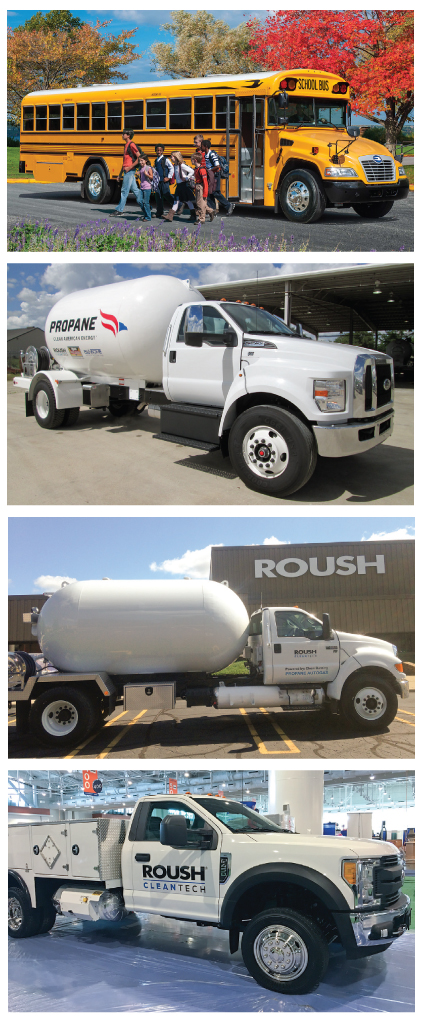Monday, March 19, 2018
 (March 19, 2018) — ROUSH CleanTech (Livonia, Mich.) recently introduced the first propane autogas engine certified to the lowest nitrogen oxide (NOx) level available in Class 4-7 vehicles. This new engine is Environmental Protection Agency- and California Air Resources Board-certified for 0.05 NOx emissions, which is 75% cleaner than the current emissions standard.
(March 19, 2018) — ROUSH CleanTech (Livonia, Mich.) recently introduced the first propane autogas engine certified to the lowest nitrogen oxide (NOx) level available in Class 4-7 vehicles. This new engine is Environmental Protection Agency- and California Air Resources Board-certified for 0.05 NOx emissions, which is 75% cleaner than the current emissions standard.According to Todd Mouw, vice president of sales and marketing, a propane autogas engine is available that can help fleets meet internal or external emissions mandates, while at the same time saving money. Regarding price, “Consider that propane autogas [costs] up to 40% less than gasoline and up to 50% less than diesel,” he said. “All this evidence leads to the conclusion that customers who want to reduce NOx emissions and save money will transition to propane autogas — opening the opportunity for increased gallons sold for marketers.”
Class 4-7 vehicles, which range from Frito Lay and UPS delivery trucks to school buses, have typically run on diesel fuel, Mouw explains. The complexity of meeting stricter emissions standards adds to the cost for diesel vehicles, in addition to the fuel itself being much more expensive. “These Class 4-7 vehicles have become a sweet spot for propane. Natural gas was trying to be a key player, but propane is better positioned to play a more effective role.”
Stricter emissions standards affecting on-road motor vehicles began going into effect in 2010. However, during the past four to six years changes in engines have made it even harder for diesel fuel to meet those standards. “This presents a huge opportunity for propane,” Mouw said. “Consider that, despite all of our progress, propane has just a 1.5% to 2% of the market share right now. With the clear cost advantages and environmental benefits for propane versus diesel, we should see propane market share continue to increase dramatically.”
Now with well over 10,000 school buses running on propane serving 750 school districts across 48 states, Mouw points out that propane is widely accepted in this sector, and that will focus attention on propane’s benefits in other categories as well. He underscores that the success stories in the school bus segment will help attract a lot of Volkswagen settlement dollars, further bolstering growth in school districts for buses. “With propane, we are at 10% of the school bus market,” Mouw said. “If we get to 10% of all Class 4-7 vehicles, it would require an additional 100 million new gallons of propane a year.”
As Mouw has been impressed by knowledge of the benefits of propane autogas spreading through the school bus marketplace, as well as many large beverage companies and other early adopters, he is concerned about the slowness of acceptance within the propane industry itself. “There are a few proactive retail propane marketers leading the way for propane autogas, but most remain skeptical. We could make tremendous headway if we could get more in the propane industry on board.”
Mouw highlights that retail propane marketers can have influence in their communities well beyond the traditional sales approach. “There are many retail propane people on school boards across the country. That alone should help us make additional headway. We’ve come a long way since I joined Roush 10 years ago. We’re excited to be down to 0.05 NOx emissions, but we’re working hard to get emissions down to 0.02 NOx.” —Pat Thornton
ROUSH CleanTech is an exhibitor at the 2018 NPGA Southeastern Convention, Booth 129 (Autogas Pavilion).

